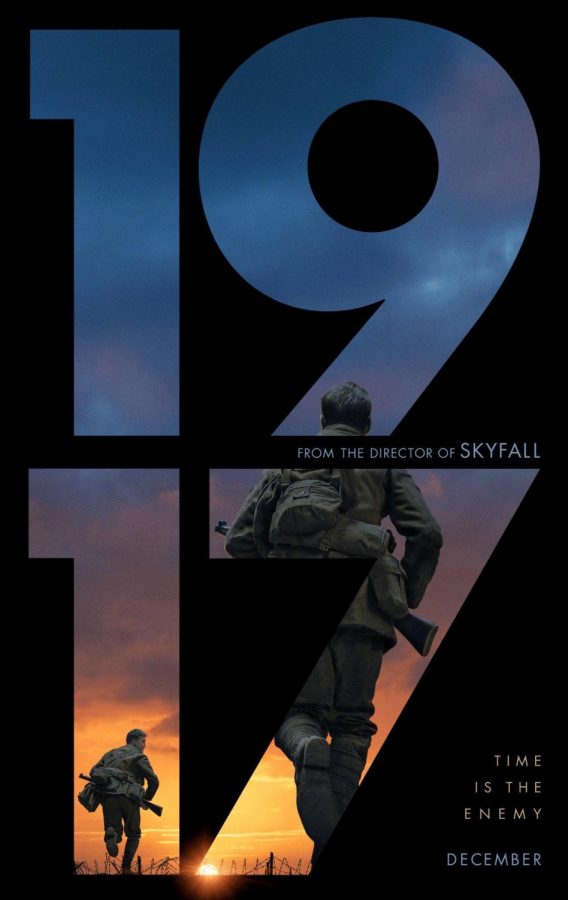Review: “1917” is a sensory experience that can lack depth
February 2, 2020
Sam Mendes’s latest war movie “1917” is an unparalleled technical achievement, showcasing the harrowing experience of being in the middle of a war.
Set during the onset of the First World War, the story is quite simple. British soldiers Schofield, played by George MacKay, and Blake, played by Dean-Charles Chapman, are dispatched for an apparent suicide mission. They are tasked with venturing through enemy lines to personally deliver a message to a British battalion. Their superior, played by Colin Firth, wants the regiment in question, led by Benedict Cumberbatch’s character, to call off their planned assault or risk walking into a catastrophic trap, which has been borne out of misdirection from the German forces.
The camera, and by extension the viewer, becomes an unflinching companion to their distressingly dangerous trek that spans two days. And it’s all done in a single, unbroken shot — or what appears to be one. Of course, the art of the single take has been perfected in cinema before, from Alfred Hitchcock’s “Rope” and the groundbreaking “Russian Ark” to “Birdman” and Mendes’s own Day of the Dead sequence in the James Bond film “Spectre.” But the fluid cinematography of Roger Deakins, which includes surreptitiously stitching shots together even with changing points of view, is nothing short of astonishing.
Moreover, what one cynical viewer may perceive as a gimmick totally works as a vehicle for artistic expression. The human person typically does not deal in different frames, and Mendes puts the audience in the middle of unwavering chaos across the French battlefields. The director deals with the acrid stench of dead bodies and the unsinking feeling of dread from making damn sure that the planes flying above the main characters are not out for their blood. “1917” feels like a real-time simulation of a video game, with its mastery of the one take and the resulting epic scale.
Music also plays an important role in realizing the vision of “1917”. The urgent score from Thomas Newman effectively serves as a companion in sonically building up tension that Schofield and Blake’s odyssey affords them. There’s also time for silence, which is just as important in letting the audience take a breather and bask in the significance of it all.
Written by Mendes and Krysty Wilson-Cairns, the movie does not dwell a lot on layered historical grandstanding. Rather, it takes its cue from seminal First World War epics such as “Paths of Glory” and “They Shall Not Grow Old”. Mendes dedicates the film to his grandfather, who served in World War I, which is certainly touching. While the story of “1917” is tellingly derivative of several war movies, down to the plotline of searching for a lost brother from “Saving Private Ryan”, it serves as a secondary way to propel the movie forward.
The film’s leads, MacKay and Chapman, effectively portray the pitiable emotions of a generation caught in the arguably bloodiest conflict the human race has ever committed on itself. MacKay in particular perfectly evokes the youth’s premature world-weariness coupled with an unblinking desire for hope, in what is one of the best acting performances of the year. Schofield’s undeniable dedication to his mission is what makes “1917” a force to be reckoned with.
However, the film suffers from its lack of nuance, which is an unintended consequence of its one-take usage. Other characters, such as the British military top brass played by Firth and Cumberbatch, register as nothing more than occurrences. They are merely vessels that serve to dump exposition and play second fiddle to the dynamic duo that is MacKay and Chapman. While the one-take setup of “1917” is still entertaining, it can also be distracting in the long run. While the movie’s depiction of the horrors of war is innovatively impressive, it is the cinematic equivalent of a pipe dream.
The film’s popular appeal is part and parcel of what made it earn its Golden Globes, an unexpected winning streak that may eventually repeat at the upcoming Oscars. It doesn’t attempt to patronize so much as to contextualize the real life machinations of the First World War. Besides, it speaks to emotion and thrill, and that is not necessarily a bad thing. “1917” may be a sanitized depiction of the undaunted trek through hell, but Mendes’s technical passion makes it an absolute must-watch.









